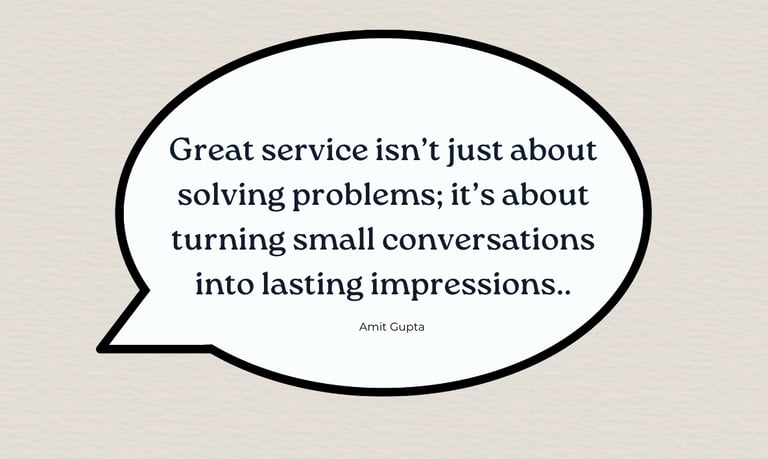The Power of Small Conversations in Customer Service
CUSTOMER EXPERIENCE


After two decades in customer service, one thing has become crystal clear to me: it’s the little things that make the biggest impact. A quick, genuine conversation—a compliment, a moment of empathy, or a shared laugh—can transform an ordinary interaction into something unforgettable. In a world where automation dominates, these small, human connections are more powerful than ever. Let’s explore how they can completely reshape the customer experience.
I’ve been deeply involved in customer service for over two decades, working across industries and geographies, and there’s one lesson that stands out above all others: it’s the small conversations that make the biggest difference. In a world where standard scripts and automated bots are becoming the norm, these genuine, human interactions are what truly transform the customer experience.
Sure, resolving issues quickly and efficiently is crucial. But it’s the personal, meaningful moments—those small conversations that go beyond the script—that leave a lasting impression on customers. These moments remind them they’re more than just a ticket number or a sale—they’re valued individuals.
Why Small Conversations Matter More Than Ever
As customer service becomes increasingly automated, the role of small talk is more important than ever. Chatbots and standard scripts can handle basic tasks, but they lack one critical element: human connection. This is where customer service reps have an opportunity to stand out—not by sticking rigidly to the script, but by bringing their own personality and warmth to the conversation.
Here’s why small conversations matter so much:
They Bring Back Humanity
Automation may be efficient, but it’s also impersonal. Small conversations reintroduce the human element, creating an emotional connection that no bot or script ever could.They Make Customers Feel Valued
When reps take the time to engage in meaningful small talk, it sends a message: You’re more than just a customer to us—you’re important. That feeling of being valued builds trust and loyalty.They Show the Rep’s Personality
Customers don’t want to feel like they’re talking to a robot—even when they’re not. Reps who bring their unique personalities into the conversation make the experience more authentic and memorable. Whether it’s humor, empathy, or shared enthusiasm, personality turns an interaction into a connection.They Leave a Lasting Impression
Customers may not remember the exact resolution you provided, but they’ll never forget how you made them feel. Small conversations have a way of sticking in people’s minds, turning routine interactions into stories they’ll share with others.
How to Make Small Conversations Count
Small talk isn’t about filling space—it’s about making a genuine connection. Here’s how customer service reps can turn small conversations into meaningful experiences:
Be Present and Listen
Customers can tell when you’re not fully engaged. By actively listening and responding to what they say, you show that you care.
Example:
Customer: “I’m so relieved this order will arrive in time for my son’s birthday!”
Rep: “Oh, that’s fantastic! Birthdays are such a big deal—how old is he turning?”Personalize the Interaction
Use the customer’s name and reference details they’ve shared. Personalization makes the conversation feel tailored and special.
Example: Instead of saying, “Your item will be delivered soon,” say, “Maria, your item should arrive on Friday—just in time for your weekend plans!”Inject Your Personality
Reps should feel empowered to be themselves. A little humor, warmth, or empathy can go a long way in making customers feel comfortable and valued.
Example:
Customer: “I hope this order works out—I’ve had bad luck with online shopping.”
Rep: “Don’t worry, you’re in good hands now! Think of us as your lucky charm.”Go Beyond the Problem
Address the issue, of course, but take a moment to ask about the customer’s day, comment on something they mentioned, or offer a small tip.
Example: If a customer mentions they’re preparing for a trip, you might say, “Travel can be so stressful—I hope everything goes smoothly! Have a great time.”
Small Conversations That Created Big Impact
Let me share a few moments from my experience that show the power of small conversations:
The Marathon Shoes Story
A customer once called to check on a pair of sneakers they’d ordered, mentioning they needed them for an upcoming marathon. The rep didn’t just confirm the delivery date—they asked about the race, wished them good luck, and added, “Remember, it’s not about the time, it’s about crossing the finish line!” That simple encouragement stuck with the customer, who later returned to share their race success and thank the rep.The Delayed Luggage Connection
An airline passenger called about delayed luggage, worried because they had a critical business meeting the next day. The rep not only reassured them about the luggage but also suggested a nearby store for essentials and wished them luck for their presentation. The customer later praised the airline publicly, saying, “That rep didn’t just solve my problem—they saved my day.”A Cup of Empathy
A coffee chain customer called about a botched online order, frustrated and out of patience. The rep, rather than sticking to a rigid apology, empathized, saying, “I’d be frustrated too! Let me make this right for you—and while we’re at it, let me send you a coupon for your next coffee on us. Everyone deserves a break.” That little extra touch turned an angry customer into a loyal one.
The Magic in the Little Things
Customer service isn’t just about solving problems—it’s about creating connections. And while scripts and bots might streamline efficiency, they can never replace the warmth and authenticity of small conversations.
When customer service reps take the time to listen, personalize, and bring their personality into interactions, they elevate the experience from transactional to transformational. Those small moments don’t just solve problems—they build trust, foster loyalty, and create memories customers carry with them long after the issue is resolved.
In a world that’s becoming increasingly automated, small conversations are the superpower that sets exceptional customer service apart. Let’s make them count.
